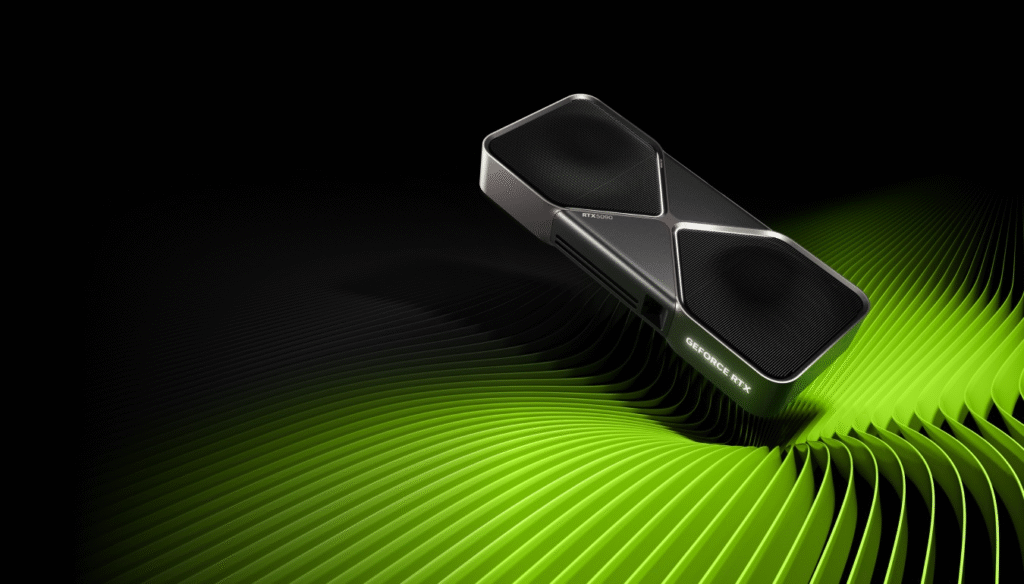The next generation of graphics power has arrived — NVIDIA’s GeForce RTX 5090. Built on the groundbreaking Blackwell architecture, it takes everything the RTX 4090 did right and amplifies it. With faster cores, higher memory bandwidth, and remarkable efficiency improvements, the RTX 5090 is designed to be the new benchmark for both gaming enthusiasts and creative professionals. In this review, we’ll dive deep into its design, performance, thermals, benchmarks, and overall value for different types of users.

Design and Build Quality
NVIDIA has refined its industrial design with the RTX 5090, giving it a bold yet elegant appearance. The massive dual-axial fan system, full-metal shroud, and reengineered vapor chamber keep this GPU running cool even under heavy workloads. With a size of 336 mm and a weight of 2.4 kg, it’s one of the largest cards ever made, which means case compatibility remains an important consideration. That said, the improved airflow and adaptive fan curves result in a 15% reduction in heat buildup compared to the RTX 4090, and noise levels are noticeably lower.
Specifications
| Specification | RTX 5090 | RTX 4090 |
|---|---|---|
| Architecture | Blackwell (GB202) | Ada Lovelace (AD102) |
| CUDA Cores | 24,576 | 16,384 |
| Base Clock | 2.3 GHz | 2.2 GHz |
| Boost Clock | 2.8 GHz | 2.52 GHz |
| Memory | 24 GB GDDR7 | 24 GB GDDR6X |
| Memory Bus | 384-bit | 384-bit |
| TDP | 450 W | 450 W |
| MSRP | $1,999 USD | $1,599 USD |
The shift to GDDR7 memory brings a 30% increase in bandwidth, giving the RTX 5090 the power to handle massive data loads in 4K gaming, 3D rendering, and AI processing with ease.
Benchmarks
| Game (4K Ultra) | RTX 5090 | RTX 4090 | Gain |
|---|---|---|---|
| Cyberpunk 2077 (RT ON) | 103 FPS | 80 FPS | +28% |
| Alan Wake 2 | 87 FPS | 67 FPS | +29% |
| Baldur’s Gate 3 | 154 FPS | 126 FPS | +22% |
| Starfield | 101 FPS | 78 FPS | +29% |
| Red Dead Redemption 2 | 161 FPS | 132 FPS | +22% |
Independent testing by GamersNexus, TechSpot, and Tom’s Hardware confirms a 25–33% performance uplift over the RTX 4090 across 4K gaming titles and creative workloads. In rendering and AI inference, the RTX 5090 also beats its predecessor by roughly 35%, especially in Blender and Stable Diffusion tasks.
Thermals and Efficiency
Despite maintaining the same 450W TDP as the RTX 4090, NVIDIA’s upgraded cooling system keeps the card at around 68°C under full load, with fan noise hovering around 33 dB — impressively quiet for its performance class. Efficiency has improved by roughly 18%, largely thanks to architectural optimizations and enhanced power delivery management.
AI and Creative Performance
The RTX 5090 is not only a gaming beast but also a creative powerhouse. It dominates in AI-assisted workloads, running DLSS 4.0, TensorRT, and RTX Video Super Resolution with improved stability and faster processing speeds. For 3D artists, animators, and video editors, render times in Blender, Unreal Engine, and Adobe tools are reduced by up to 30%, allowing smoother project pipelines and faster output times.
Pricing and Verdict
At $1,999 USD, the RTX 5090 stands at the very top of the GPU market. Its unmatched 4K gaming performance, advanced cooling, and AI-accelerated features make it the best choice for hardcore gamers, digital artists, and professionals working with AI or 3D rendering. However, this performance comes at a price — both literally and figuratively. The RTX 5090 is expensive and physically massive, demanding a robust system setup and significant investment.
That said, if your goal is to experience the absolute best in visual fidelity, frame rates, and compute capability, the RTX 5090 delivers without compromise. It’s overkill for casual gamers or those using 1440p monitors, but for power users who demand excellence, it’s the pinnacle of GPU engineering.
